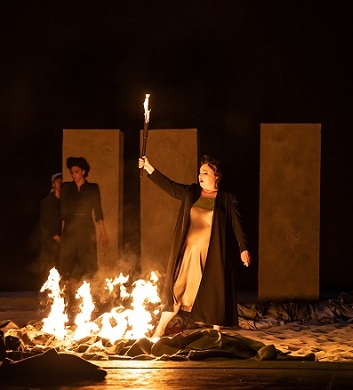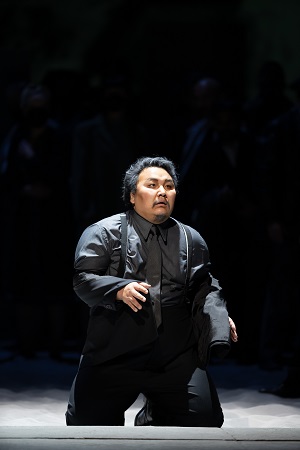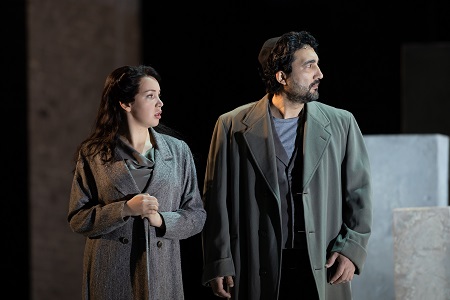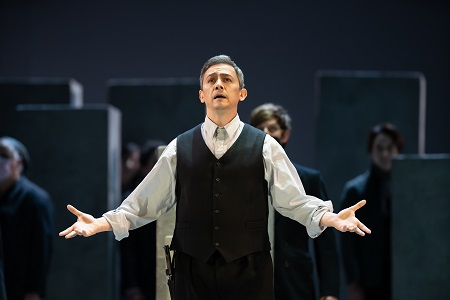The run-up to curtain-up wasn’t auspicious. The Royal Opera House prefaced this opening night of the revival of Daniele Abbado’s 2013 production of Nabucco with an earlier announcement that the next two performances of Verdi’s biblical epic of religious enlightenment and reckoning, on 23rd and 28th December, had had to be cancelled, ‘due to resource challenges caused by the Omicron COVID-19 variant’.
Then, for the punters who had defied London’s omni-omicron onslaught, there was one of those heart-sinking moments when, instead of the composer’s baton going down, the house lights go up and a besuited chap strides onto the platform, prompting anticipation of bad news. In this case, Covent Garden’s artistic director Oliver Mears was here to tell us that the show was going on, but that the ROH Chorus would be masked: cue some sulky booing from the stalls, which was quickly stifled by supportive applause. What was the rabble’s problem? Clearly, the aim was to protect the cast of soloists, many of whom had jetted in from Russia and the Ukraine, the ROH Chorus, and the production itself. If only those making difficult decisions about the health of the nation, the economy and the country’s cultural heart-and-soul beat were as rational, selfless and honest.
Masks or no masks, the ROH Chorus sang their hearts out. Huddled together in a tight knot of faith and fearlessness, these Hebrews were vulnerable but determined. Their prayer, ‘Va, pensiero’, was uplifted by the sincerity of their belief and the beauty of their song, the lyric consonance of which seemed to have been anticipated by the honeyed smoothness and balanced concordance of the brass chorale which had opened the overture.

This was one of the best performances that I’ve witnessed from conductor Daniel Oren at Covent Garden. He drew superb singing and diverse emotions from the ROH Chorus, his gestures vivid, sincere and inspiring. I loved the enthusiastic, almost hyperactive, hand-fluttering with which he whipped up the choral and instrumental temperature – and whether the up-beat was down, or the down-beat was up might not have been clear from my seat at the back of the stalls, but it clearly meant an awful lot to all involved. Oren seemed to find fresh meaning in what can be Verdi’s rum-ti-tum mundane. The tuneful compendium of the overture was much more than a miscellany of melodies. And, Oren balanced the need to sustain the musico-dramatic momentum, when the kinetic comings and goings are repeatedly interrupted by long arias of stately grandeur, with those arias’ need for long-breathed expressiveness. Thus, there was both movement and meditation, and, in an opera which prioritises lyricism over logic, there was musical persuasiveness and coherence.
There was plenty of instrumental colour, too, aurally alleviating the visual dullness of Alison Chitty’s shades-of-grey designs which site the rescue of the Jewish people from Babylonian captivity in a sand-and-stone arena which permits allusions to both the horrors of the Holocaust and hopelessness of modern-day refugeeism. The sturdy stone blocks which people the stage – a nod to the grid of concrete slabs which form Berlin’s Memorial to the Murdered Jews of Europe – restrict the potential for imaginative choreography of the enlarged choral forces and push the soloists to the front of the stage. And, on this occasion some unobtrusive social distancing seemed to render Verdi’s stand-and-deliver arias even more dramatically static, which didn’t enhance the dramatic clarity of a production in which the wrenching twists of political fortune and personal fate can be ambiguous at best, unfathomable at worst.

But, if the soloists didn’t move, their voices certainly did. The cast, lacking a single Italian singer, uniformly turned the volume dial up and displayed the vocal power and punch to communicate the protagonists’ emotional extremes with stirring conviction, as psychological instability, driven by a psychotic lust for power, was juxtaposed with unswerving steadfastness of temperament and faith.
As the despotic and deranged titular monarch, the Mongolian baritone Amartuvshin Enkhbat evinced a blazing intensity, and was as compelling when arrogantly asserting his own divinity as when beseeching forgiveness for his blasphemous hubris. His thunderbolt-induced madness was truly unhinged; in ‘Oh, di qual onta aggravasi questo mio crin canuto!’, his supplications to save his daughter Fenena, who has been condemned by his own misguidedness and Abigaille’s malicious machinations, were beautifully tender. And, in the final act, when Nabucco miraculously regains his reason, the enlightened King’s prayers to the God of Judah were infused with sonorous sincerity.
In 2016, I described the Ukrainian soprano Liudmyla Monastyrska as ‘a fiery, feverish Abigaille, as power-hungry as Lady Macbeth and sharing all the latter’s coldness of heart, utterly unmoved as she was by Nabucco’s pleas to spare Fenena’s life’. On this occasion, Regan gleefully ripping out Gloucester’s eyes and relishing Lear’s downfall and death might be a more apt Shakespearean comparison for Verdi’s biblical bad girl. Dominating the stage with almost crazed histrionics and haughtiness, and a huge vocal presence, Monastyrska’s terrifyingly unpredictable Abigaille had enough ‘issues’ and inferiority complexes to keep the psychoanalysts occupied eternally.

Occasionally, I feared that there was a danger that things might skid out of control, but the soprano kept a tight grip on the almost impossible vocal demands, nailing the double-octave leaps, fearlessly and flamboyantly flinging her voice above and below the stage, even if the trills were a bit fudged and the coloratura was sometimes lacking a little in grace. Stridently steely in ‘in ‘Salgo già del trono aurato’, perhaps even a touch too raw at times, she then displayed a truly tender pianissimo and pathos in ‘Anch’io dischiuso un giorno’, allowing us a genuine, but all too brief, insight into Abigaille’s tortured heart.
As Fenena, the Siberian mezzo soprano Vasilisa Berzhanskaya was the perfect counterpart to Monastyrska’s unhinged Abigaille, singing with beautiful bel canto lyricism and purity, her stage presence assured, her acting entirely persuasive. Fenena’s last-moment vision of heaven, ‘Oh, dischiuso è il firmamento’, was wonderfully direct and unmannered, imbued with elegance and freshness, impeccably sung but full of human feeling. The mezzo soprano impressed my Opera Today colleague Michael Milenski in Rome in February 2020 and Berzhanskaya shared the 2021 International Opera Awards Mayars Young Singer prize with tenor Xabier Anduaga. This performance made it absolutely clear why.

As the High Priest Zaccaria, Russian bass Alexander Vinogradov’s vocal warmth and comforting weight impressed. When he urged the Israelites to stay steadfast and pray to their God, there was real conviction and spiritual certainty in his phrasing and vocal colouring. Ukrainian tenor Najmiddin Mavlyanov made as much as he could of the not very generous role of Ismaele, and both Blaise Malaba – a High Priest of Baal of profundity and gravitas – and April Koyejo-Audiger, as a characterful Anna (Zaccaria’s sister), gave impressed, poised performances.
When Nabucco premiered at La Scala in March 1842, Verdi remarked, ‘though I had many difficulties to fight against, it is certain that Nabucco was born under a lucky star’. Times feel rather less promising at present. Let’s hope, by the time that Anna Netrebko returns to Covent Garden in January to replace Monastyrska, that, as for the Hebrews, the sun of a more propitious day has arisen.
Claire Seymour
Nabucco – Amartuvshin Enkhbat, Abigaille – Liudmyla Monastyrska, Zaccaria – Alexander Vinogradov, Fenena – Vasilisa Berzhanskaya, Ismaele – Najmiddin Mavlyanov, High Priest of Baal – Blaise Malaba, Anna – April Koyejo-Audiger, Abdallo – Andrés Presno; Director – Daniele Abbado, Associate director – Boris Stetka, Conductor – Daniel Oren, Designer – Alison Chitty, Lighting designer – Alessandro Carletti, Video designer – Luca Scarzella; Movement – Simona Bucci, Orchestra and Chorus of the Royal Opera House (Chorus master, William Spaulding).
Royal Opera House, Covent Garden, London; Monday 20th December 2021.
ABOVE: Royal Opera House Chorus in Nabucco © ROH / Bill Cooper